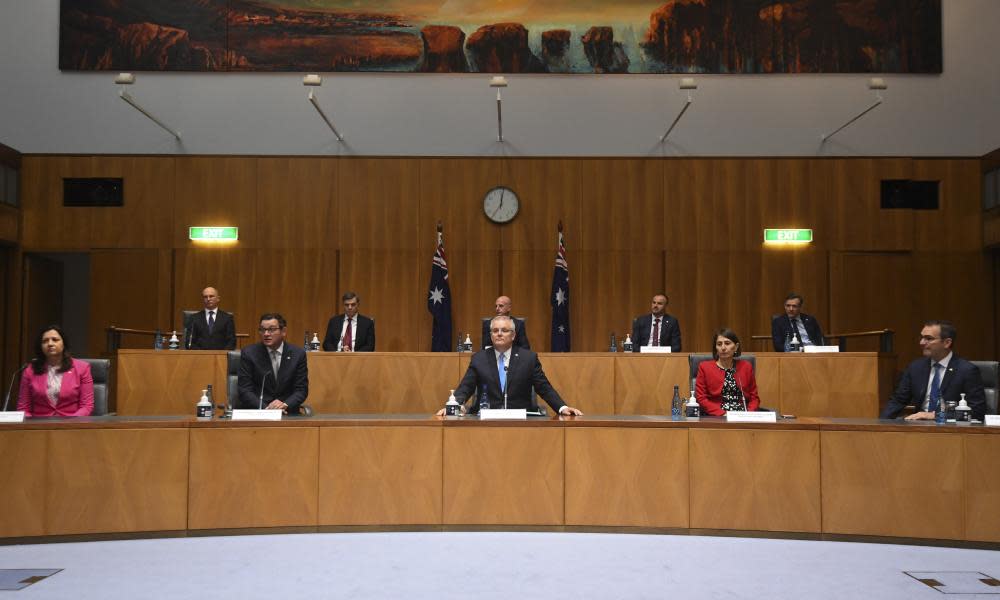Human rights commission says national cabinet should not be covered by secrecy laws

The term national cabinet is “misleading” and extending cabinet secrecy to the intergovernmental body would permanently reduce transparency, Australia’s top human rights body has warned.
The Australian Human Rights Commission made the comments in a submission calling for the central plank of the government’s bill to extend secrecy to national cabinet to be rejected.
However, the national cabinet leaders are pushing back against attempts to subjugate its deliberations into being more transparent, releasing a special joint-statement on Friday night underlining the importance the nation’s leaders place on their discussions remaining confidential.
“The disclosure of national cabinet documents or discussions other than in accordance with the principles agreed by national cabinet would undermine its effective operation and severely damage relations between the commonwealth and the states and territories,” the joint statement said.
“It would potentially expose negotiations and discussions before their conclusion and prevent the open flow of information between members of the national cabinet.
“This would undermine the trust between the Commonwealth and the States and Territories and would prevent full and frank discussions that achieve the best outcomes for the Australian public.
“In turn this would lead to poorer outcomes and adversely affect all governments’ abilities to consider and respond to issues urgently, and would undermine the key decisions needed to deliver outcomes in the public interest.”
The Morrison government introduced legislation earlier in September to blunt the impact of a recent tribunal decision that would have allowed access to key documents.
In early August the Administrative Appeals Tribunal ruled the national cabinet – comprised of the prime minister, premiers and chief ministers – was not, as Scott Morrison regularly contended, a subcommittee of the federal cabinet.
The bill would change the law so that where commonwealth legislation makes provisions to protect the secrecy of federal cabinet deliberations, such as freedom of information laws, those same protections extend to the “committee of cabinet known as the national cabinet”.
The bill has been referred to a Senate inquiry after outcry from senator Rex Patrick, who brought the winning case and accused Morrison of acting like a “sore loser” and seeking to stifle public scrutiny.
Related: Battle to unlock secret of Scott Morrison’s national cabinet faces tribunal
In the AHRC submission, the president, Rosalind Croucher, said that national cabinet “is not a cabinet body”, arguing “the use of the term ‘cabinet’ is misleading and obfuscates the nature of the body”.
“The national cabinet is an intergovernmental forum, made up of representatives of jurisdictions with sovereign powers, and the prime minister is the only member accountable to federal parliament.”
In addition to exempting it from FOI laws, the AHRC noted the bill would allow ministers to issue certificates that prevent the disclosure of national cabinet material.
By contrast, the AHRC noted that the predecessor to national cabinet, the Council of Australian Governments, was required to publish outcomes of its meetings, that its materials were accessible via FOI requests and Coag members could comment openly on its decisions.
“The [AHRC] is concerned that bringing the national cabinet under the remit of cabinet secrecy rules will reduce transparency and accountability, and may implicate the right to freedom of expression by unnecessarily restricting the open communication of information to, and by, the public,” it said.
The AHRC noted that Covid-19 had instigated “potentially transformational changes to said operations in Australia”.
“It is important to ensure that executive power is not unnecessarily or permanently expanded through related administrative efficiency measures, as this would have negative implications for democratic principles and the rule of law.”
The AHRC recommended the third schedule of the bill, related to national cabinet secrecy, “not be enacted”.
In May 2020 Morrison defended cabinet secrecy applying to policy discussions between state and federal governments, telling reporters in Canberra national cabinet was “not a spectator sport” but rather a “serious policy deliberation”.
Labor has been highly critical of the legislation, with shadow attorney general Mark Dreyfus arguing “at a time when record amounts of taxpayers’ funds are being spent responding to the pandemic, the Australian people have every right to be kept informed about what is being done in their name and not be fobbed off with more of Mr Morrison’s secrecy and spin”.
In their statement, released after the most recent national cabinet meeting where the matter was discussed, the federation leaders, which include Labor premiers and chief ministers, argued the principles of cabinet confidentiality applied to the national cabinet had not prevented disclosure of its outcomes.

 Yahoo News
Yahoo News 
